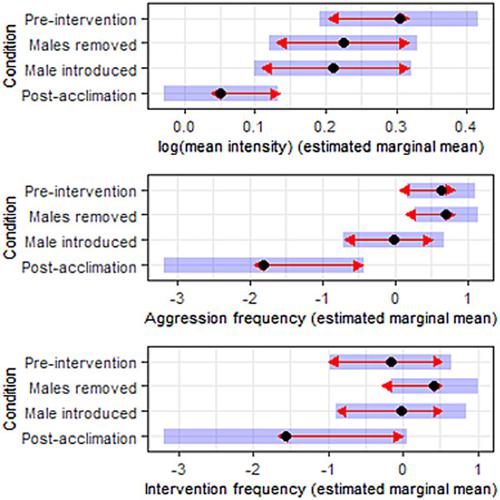当前位置:
X-MOL 学术
›
Am. J. Primatol.
›
论文详情
Our official English website, www.x-mol.net, welcomes your
feedback! (Note: you will need to create a separate account there.)
Reproductive males are effective at managing conflict in captive Sulawesi crested macaques (Macaca nigra)
American Journal of Primatology ( IF 2.0 ) Pub Date : 2021-05-10 , DOI: 10.1002/ajp.23266 Veronica B Cowl 1, 2 , Susan L Walker 1 , Susanne Shultz 2
American Journal of Primatology ( IF 2.0 ) Pub Date : 2021-05-10 , DOI: 10.1002/ajp.23266 Veronica B Cowl 1, 2 , Susan L Walker 1 , Susanne Shultz 2
Affiliation

|
Group size, density, and composition significantly influence the expression of agonism and, as demography is frequently manipulated in captivity, natural mechanisms of conflict management may be disrupted. Here, we examine how changes to the social and physical environment of a captive group of Sulawesi crested macaques, Macaca nigra, influenced mechanisms of conflict management. The initial group was comprised of females, juveniles, and castrated males; under a series of management interventions, the group was moved to a new enclosure, 75% of the castrated adult males were removed, 67% of the females were contracepted, a novel, intact male was introduced, and the group was allowed access to an outdoor enclosure. Despite a decreasing trend in aggression following the changes to the social group, we found no significant differences in aggression or intervention behavior in the 5-week periods immediately following changes to the social group, apart from a significant decrease in aggression following the introduction of the novel male. This decrease in the frequency of aggression was still evident 10 weeks after the interventions occurred, and was coupled with a decrease in the intensity of aggression. Moreover, the intensity of aggression as well as the frequency of aggression and intervention were significantly lower under low-density conditions. Our results highlight how management changes to the social and physical environment can influence aggressive behavior, albeit following a period of acclimation. We discuss the relative impacts of social group composition, social density, and individual reproductive status on the management of conflict behavior in a captive setting.
中文翻译:

繁殖雄性在管理圈养苏拉威西凤头猕猴(Macaca nigra)的冲突方面很有效
群体规模、密度和组成会显着影响激动的表达,并且由于人口统计经常在圈养中被操纵,冲突管理的自然机制可能会被破坏。在这里,我们研究了一群圈养的苏拉威西凤头猕猴Macaca nigra的社会和物理环境如何变化, 影响冲突管理的机制。最初的一组由雌性、少年和阉割的雄性组成;在一系列管理干预下,该组被转移到一个新的围栏,75% 的阉割成年雄性被移除,67% 的雌性被避孕,引入了一个新的、完整的雄性,并允许该组进入一个室外外壳。尽管随着社会群体的变化,攻击性有下降的趋势,我们发现在社会群体变化后的 5 周内,攻击性或干预行为没有显着差异,除了在引入小说男。在干预发生 10 周后,攻击频率的降低仍然很明显,并且伴随着攻击强度的降低。此外,在低密度条件下,攻击的强度以及攻击和干预的频率显着降低。我们的结果强调了社会和物理环境的管理变化如何影响攻击性行为,尽管经过一段时间的适应。我们讨论了社会群体构成、社会密度和个体生殖状况对圈养环境中冲突行为管理的相对影响。尽管经过一段时间的适应。我们讨论了社会群体构成、社会密度和个体生殖状况对圈养环境中冲突行为管理的相对影响。尽管经过一段时间的适应。我们讨论了社会群体构成、社会密度和个体生殖状况对圈养环境中冲突行为管理的相对影响。
更新日期:2021-06-24
中文翻译:

繁殖雄性在管理圈养苏拉威西凤头猕猴(Macaca nigra)的冲突方面很有效
群体规模、密度和组成会显着影响激动的表达,并且由于人口统计经常在圈养中被操纵,冲突管理的自然机制可能会被破坏。在这里,我们研究了一群圈养的苏拉威西凤头猕猴Macaca nigra的社会和物理环境如何变化, 影响冲突管理的机制。最初的一组由雌性、少年和阉割的雄性组成;在一系列管理干预下,该组被转移到一个新的围栏,75% 的阉割成年雄性被移除,67% 的雌性被避孕,引入了一个新的、完整的雄性,并允许该组进入一个室外外壳。尽管随着社会群体的变化,攻击性有下降的趋势,我们发现在社会群体变化后的 5 周内,攻击性或干预行为没有显着差异,除了在引入小说男。在干预发生 10 周后,攻击频率的降低仍然很明显,并且伴随着攻击强度的降低。此外,在低密度条件下,攻击的强度以及攻击和干预的频率显着降低。我们的结果强调了社会和物理环境的管理变化如何影响攻击性行为,尽管经过一段时间的适应。我们讨论了社会群体构成、社会密度和个体生殖状况对圈养环境中冲突行为管理的相对影响。尽管经过一段时间的适应。我们讨论了社会群体构成、社会密度和个体生殖状况对圈养环境中冲突行为管理的相对影响。尽管经过一段时间的适应。我们讨论了社会群体构成、社会密度和个体生殖状况对圈养环境中冲突行为管理的相对影响。











































 京公网安备 11010802027423号
京公网安备 11010802027423号